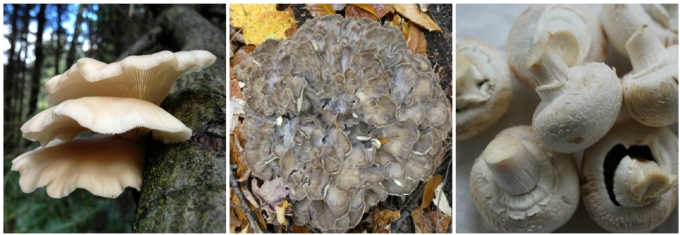Using herbs and healthy food choices as a means to avert and treat colds and flu speaks volumes. Herbal medicine has been used for thousands of years to treat a variety of ailments, yet in many cultures, mushrooms have also aided in maintaining good health – including averting colds, flu and other common winter ailments.
Prevention
Prevention is critical no matter whether you want to prevent colds, coughs, flu, or diseases. In order to increase our chances of preventing health ailments, our immune system needs a variety of factors to operate at maximum “capacity”. Getting regular, good quality sleep is one factor. A good diet and supplementation to ensure your body has all the nutrients it requires on a daily basis is also very important. Washing hands is paramount. However, avoiding processed sugars is critical in order to keep your immune system healthy. Studies have clearly shown that consuming 20 teaspoons of sugar, (two average 12-ounce sodas) suppresses the body’s immune responses. Reading labels and knowing where sugars are hiding in processed foods is part of a good prevention protocol.
Button Mushrooms for the Immune System
Not everyone has the opportunity to get out and forage for mushrooms. All mushrooms are considered a healthy source of many essential nutrients and therapeutic bioactive compounds. Agaricus bisporus, more commonly known as the store-bought button mushroom, is the most important commercially-cultivated mushroom in the world. Rich nutrients such as carbohydrates, proteins, lipids, fibres, minerals, and vitamins are present in this mushroom. Moreover, because these mushrooms (and many wild mushrooms) have active ingredients, such as polysaccharides, lipopolysaccharides, essential amino acids, peptides, glycoproteins, nucleosides, triterpenoids, lectins, fatty acids , they have been reported to have antimicrobial, anticancer, antidiabetic, antihypertensive, hepatoprotective and powerful antioxidant activities.
Mushrooms are known to be an excellent accumulator of minerals from the environment in which they grow. Agaricus bisporus is an excellent source of potassium, sodium, iron, zinc, copper, selenium, and manganese.
Total phenolics and antioxidant properties of the common button mushroom have been reported by many researchers to have higher antioxidant capacities than Lentinula edodes (shitake), Pleurotus ostreatus (oysters), Pleurotus eryngii (king oysters) and Grifola frondosa (maitake).
Wild Mushrooms and the Immune System
For those who enjoy getting outdoors and foraging for their fungi, there is no shortage of wild mushrooms that can help build our immune system in order to prevent colds and flu.
Ganoderma lucidum is perhaps one of the most studied mushrooms worldwide. The benefits of this wild mushroom could fill and entire volume of an encyclopedia. One drawback though, June is usually the month to harvest reishi.
Reishi is one of the primary herbs of choice in any immune-deficiency disease. It possesses a broad spectrum of immunostimulating activities, as well as anti-inflammatory and antiallergenic properties. It contains more than one hundred oxygenated triterpenes. Triterpenes are scientifically proven to be correlated with the immune response.
Reishi has been widely used for a variety of infectious diseases such as bronchitis and hepatitis. It stimulates phagocytosis, increases T-cell activity and is a treatment for viral hepatitis. There is not a doubt that reishi can help prevent colds and flu.
In a scientific study, Pleurotus ostreatus (oysters), Fomes fomentarius (tinder conk), Auriporia aurea, and Trametes versicolor (turkey tails), were determined to be effective in helping to prevent influenza. (Oysters, tinder conks and turkey tails all can be harvested in the autumn months.)
For decades, Grifola frondosa (maitake), and Lentinula edodes (shitake) have been studied extensively by many researchers worldwide and have been proven to be effective in stimulating the cellular and humoral branch of immune reactions. Also, glucans in these and other mushrooms strongly stimulate immune defense reactions. Maitake, also known as hen-of-the-woods, has a very high concentration of beta glucans and is most beneficial for our immune system.
In a patent owned by Paul Stamets, he writes:
Compounds having unique antiviral and antibacterial properties are prepared from medicinal mushroom mycelium, extracts and derivatives. The compositions are derived from Fomitopsis, Piptoporus, Ganoderma, Inonotus, Trametes, Pleurotus, and blends of medicinal mushroom species and are useful in preventing and treating viruses including Poxyiridae and Orthopox viruses, flu viruses including bird flu (H5N1), SARS and Hepatitis C (HCV), as well as infections from Mycobacterium tuberculosis, Staphylococcus aureus and Escherichia coli.
Whether you are a forager in the woods or in the grocery store, science has proven that mushrooms can greatly benefit our immune system in order to prevent colds and flu. Adding mushrooms to your daily diet along with getting proper sleep, eating a healthy diet, avoiding sugar, and frequent hand washing, just might get you through the winter months without even a sniffle.
Sources:
https://www.ncbi.nlm.nih.gov/pubmed/25358999
https://www.ncbi.nlm.nih.gov/pmc/articles/PMC4202470/
http://www.medicalmushrooms.net/agaricus-bisporus-common-mushroom/
https://www.sciencedirect.com/topics/biochemistry-genetics-and-molecular-biology/ganoderma-lucidum





I knew that mushrooms are very useful and they have many different uses and properties, but in this article, mushrooms opened up for me from a completely different side. Thank you for sharing this interesting article, I saw on your site more info about mushrooms, I’ll go read it.